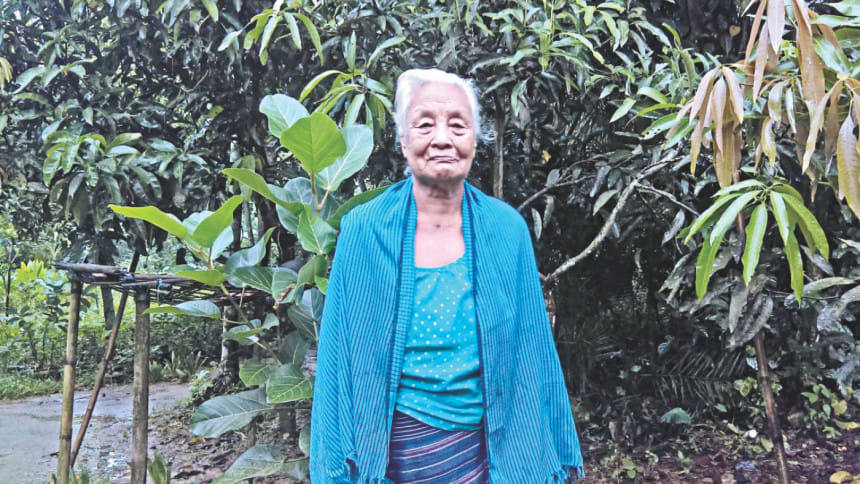Torchbearer of Madhupur

When 85-year-old Protibha Sangma from Idlipur village in Tangail's Madhupur forest reflects on life, she has reasons to feel content. As her own Garo community struggled to find its place in a changing world, she was at the forefront. She's long been education's champion.
“As a teacher Protibha Didi was strict,” says ex-student Maria Chiran, “A visionary who taught far beyond textbooks, she even gave girl-guide training!”
Maria, the current headmistress of Corpus Christi High School in Jalchhatra, is among a number of Protibha's former pupils to have pursued professional careers. “Protibha Didi faced enough obstacles in completing her own schooling; then she served our community her entire life. She is education's pioneer.”
When the second of five children to struggling farmer Sanatan Sangma was young, schooling was uncommon. But Protibha's culturally-minded mother Bangabala Chambugoni encouraged study.
“Our village was surrounded by dense sal forest then,” Protibha recalls. “It was full of wild animals: leopards, buffaloes, peacocks, monkeys and boar. At sunset the whole area trembled to the roar of tigers.”
From class eight Protibha was admitted to St Mary's Girls School in Mymensingh's Haluaghat , but her family was soon unable to bear the schooling expenses. Rather than quitting, she tutored younger students to pay her way.
“When I returned home for the holidays,” she says, “I bought goats and boars for neighbours to rear.” When the livestock were sold the profit would help her family.
Later she stopped going home. “My father was pressuring me to marry,” she recalls. “I dreamt of becoming a doctor.” As difficult as it was not to see her relatives, Protibha pursued her goal. She studied at Vidyamoyee Girls' School in Mymensingh while boarding at a French-run Baptist hostel.
Ultimately, economic realities precluded her studying medicine. She completed instead a year of training in Dhaka and joined Mymensingh's Holy Family School in 1952 as a teacher.
In 1965, she decided to transfer to a primary school in Madhupur. “I went house to house to motivate mothers to send children to school,” Protibha says, “especially daughters. I told them without education it's difficult to survive.”
Many children weren't attending school because they had no suitable clothes. “A pant-and-shirt set cost one taka in those days,” she says, “I bought clothes for as many as I could.”
Nor did she lose interest in health. “I enquired after babies, whether they were being breast-fed, to promote proper nutrition.”
On the cultural front Protibha was likewise active. From the early twentieth century, the Garos converted to Christianity and with it came western cultural values. “I advised our young people not to forget their roots. We may be Christian but we are also Garo. It's a matter of pride.”
When 1971 arrived, as elsewhere the Madhupur community had to manage the realities of war. “Along with the missionaries, Garos secretly helped the freedom fighters,” Protibha says. “We brought them to our homes. I remember feeding them puffed rice and molasses. The Pakistani army came searching for them, but because the commanding officer in this area was a Christian we were spared harm.”
After independence Protibha took a lead role in establishing Madhupur Girls High School, collecting door-to-door donations. For the next two decades she worked there, until she retired.
Today most of Madhupur's 30,000-strong Garo community are well-schooled. There are around 100 primary and three high schools to cater to several hundred Garo students.
“Garos were once treated as wild or lower class,” remarks Ajoy-a-Mre, president of Madhupur's indigenous cultural development forum. “Now, we are more educated than most, especially our women. It was only possible for the contribution of great souls like Protibha.”
“Protibha would meet village headmen and priests,” says Eugene Nokrek, chairman of the Joinshahi indigenous community council. “She did much to convince them to establish schools.”
Needless to say, Protibha is pleased. “It's nice to see that Garos are well-educated. Many have government jobs, as magistrates, doctors and nurses. My only advice is that education from books isn't enough. One's conscience is also a guide.”
Protibha chose never to marry, but she adopted a son, Anish Nokrek, now 65. She lives with him, his wife and their five children. As she sits in the yard of their modest earthen home reading a newspaper, perhaps the only hint of what a tenacious and vibrant woman she is, is the lack of reading glasses.
“I can't move far because of a bad knee,” she admits, “but my mind moves widely still, across Madhupur's villages.”

 For all latest news, follow The Daily Star's Google News channel.
For all latest news, follow The Daily Star's Google News channel. 








Comments